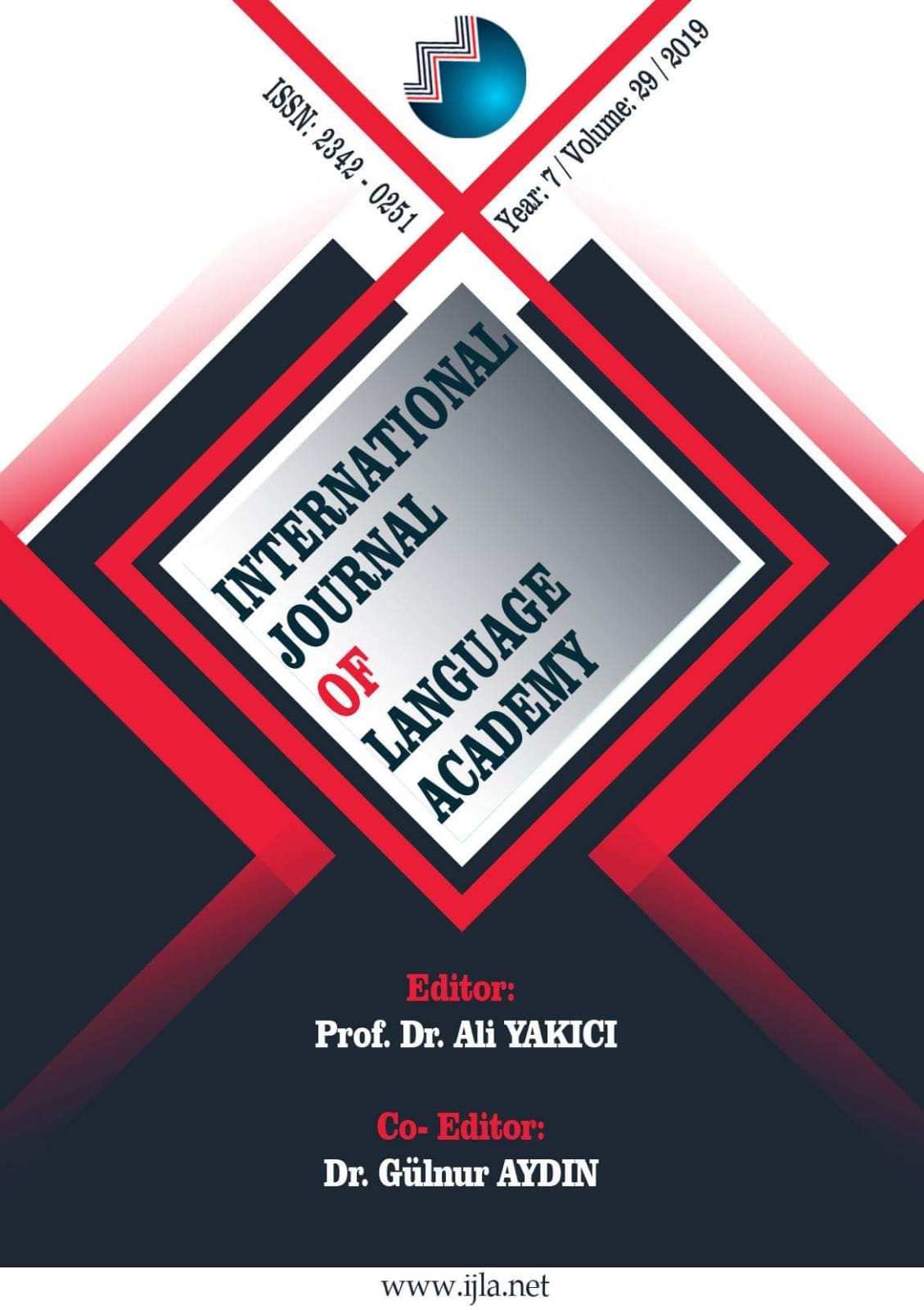Author :
Abstract
Gelişmiş ülkelerin sınırlarını kontrol etme ve dil ile vatandaşlık testleri yoluyla çoğunluk dili ve kültürünün bütünlüğünü göçmen akımına karşı koruma politikaları üzerine şimdiye kadar pek çok çalışma yapılmıştır (Blackledge, 2009; Stevenson&Schanze, 2009; Shohamy, 2009). Bununla birlikte göçmenlerin dil testi süreciyle ilgili ne düşündükleri ve deneyimleri hakkında daha az nitel çalışma bulunmakta. Mevcut çalışma göçmenlerin bakış açısından literature katkı sağlamayı amaçlamaktadır. Bu amaçla Türkiye’nin güneyinden Almanya’ya göç eden üç erkek katılımcıyla Skype üzerinden görüşme yapıldı. Katılımcıların Almanca dil ve vatandaşlık testi için çalışma ve teste girme sürecindeki deneyimlerini keşfetmek ve testin adaylar üzerindeki etkisini ve sonuçların göçmenler için ne anlama geldiğini kullanarak testin etikliğini araştırmak için yarı yapılandırılmış görüşmeler yapıldı. Yazıya dökülen görüşme verisi derinlemesine içerik analiziyle işlenerek yinelenen temalar ilgili kategoriler altında toplandı. Çalışma göçmenlerin genel olarak girdikleri dil testinden memnun oldukları ve testin göçmenlerin dil yeterliklerini ölçmek için uygun bir yöntem olduğunu düşündükleri sonucuna vardı. Bununla birlikte, üç göçmenin açıklamaları testin eşitlik açısından yetersizlikleri olduğunu ortaya çıkardı. Bu çalışma özellikle okuma-yazma bilmeyen ve yaşlı göçmenler için test eşitliğinin nasıl artırılabileceği konusunda birkaç öneriyle sonuçlanıyor.
Keywords
Abstract
Many studies (Blackledge, 2009; Stevenson & Schanze, 2009; Shohamy, 2009) have been done on the recent policies of developed countries to control their borders and ensure the intactness of the majority language and culture in the face of influx of immigrants with language and civic tests. Nevertheless, there are fewer qualitative studies done on what immigrants think of the language testing process and what they have experienced. The current research aims to contribute to the literature about language testing from immigrants’ point of view. For this purpose, three men who immigrated to Germany from southern Turkey were interviewed on Skype. Semi-structured interviews were conducted to explore their experiences during the process of studying for and taking the German language and civic test, and to investigate the ethicality of the test by drawing upon its impact on lives of test-takers and what its results mean for immigrants. Transcribed interview data were processed with in-depth content analysis and recurring themes were subsumed under similar categories. The study found that the immigrants were generally satisfied with the language test they took and considered the test to be an appropriate method of measuring the linguistic proficiency of immigrants. However, the three immigrants’ accounts revealed certain shortcomings of the test in terms of fairness. The study concludes by making several suggestions to increase the fairness of the language test particularly for illiterate and elder immigrants.
Keywords
- Bishop, S. (2004). Thinking about a professional ethics. Language Assessment Quarterly, 1(2-3), 109-122.
- Blackledge, A. (2009). Inventing English as convenient fiction: language testing regimes
- Camara, W. J. (1997). Use and consequences of assessments in the USA: Professional, ethical, and legal issues. European Journal of Psychological Assessment, 13(2), 140.
- Cooke, M., Winstanley, B., & Bryers, D. (2015). Whose integration? In Simpson, J., & Whiteside, A. (Eds.), Adult Language Education and Migration: Challenging agendas in policy and practice (pp. 214). London and New York: Routledge.
- Davies, A. (1997). Demands of being professional in language testing. Language Testing, 14(3), 328-339.
- Doerschler, P., & Jackson, P. I. (2010). Host Nation Language Ability and Immigrant Integration in Germany: Use of GSOEP to Examine Language as an Integration Criterion. Democracy and Security, 6(2), 147-182.
- Dustmann, C., & Fabbri, F. (2003). Language proficiency and labour market performance of immigrants in the UK. The Economic Journal, 113(489), 695-717.
- Gysen, S., Kuijper, H. & Van Avermaet, P. (2009). Language Testing in the Context of Immigration and Citizenship: The Case of the Netherlands and Flanders (Belgium). Language Assessment Quarterly, 6(1), 98-105.
- Hamp-Lyons, L. (1997). Washback, impact and validity: Ethical concerns. Language testing, 14(3), 295-303.
- Hogan-Brun, G., Mar-Molinero & Setevenson, P. (2009). Testing regimes: Introducing cross-national perspectives on language, migration and citizenship. In HoganBrun, G., Mar-Molinero & Stevenson, P. (Eds.) Discourse on Language and Integration (1-13). Amsterdam: Benjamins.
- Kunnan, A. J. (2012). Language assessment for immigration and citizenship. In Fulcher, G. & Dsvidson, F. (Eds.). The Routledge Handbook of Language Testing (162-177). New York: Routledge.
- Lukes, M., & Lyons, J. (2015). Educational programming for low-literate adult migrants in the US. In Simpson, J., & Whiteside, A. (Eds.), Adult Language Education and Migration: Challenging agendas in policy and practice (pp. 244). London and New York: Routledge.
- McNamara, T. (2009). Language tests and social policy: A commentary. In Hogan-Brun, G., Mar-Molinero & Stevenson, P. (Eds.) Discourse on Language and Integration (153-163). Amsterdam: Benjamins.
- Morrice, L. (2007). Lifelong learning and the social integration of refugees in the UK: The significance of social capital. International Journal of Lifelong Education, 26(2), 155-172.
- Shohamy, E. & McNamara, T. (2009). Language Tests for Citizenship, Immigration, and Asylum. Language Assessment Quarterly, 6(1), 1-5
- Shohamy, E. (2009). Language tests for immigrants: Why language? Why tests? Why citizenship? In Hogan-Brun, G., Mar-Molinero & Stevenson, P. (Eds.), Discourse on Language and Integration (45-59). Amsterdam: Benjamins.
- Shohamy, E. (2013) The discourse of language testing as a tool for shaping national, global, and transnational identities. Language and Intercultural Communication, 13(2), 225-236.
- Stevenson & Schanze (2009). Language migration and citizenship in Germany. In Extra, G., Spotti, M. & Avermaet, P. V. (Eds.), Language Testing, Migration and Citizenship (66-86). Amsterdam: Continuum
- Van Avermaet, P. (2009). Fortress Europe? Language policy regimes for immigration and citizenship. In Hogan-Brun, G., Mar-Molinero& Stevenson, P. (Eds.), Discourse on Language and Integration (1-13). Amsterdam: Benjamins.
- Zabrodskaja, A. (2009). Language testing in the context of citizenship and asylum: The case of Estonia. Language Assessment Quarterly, 6(1), 61-70.





